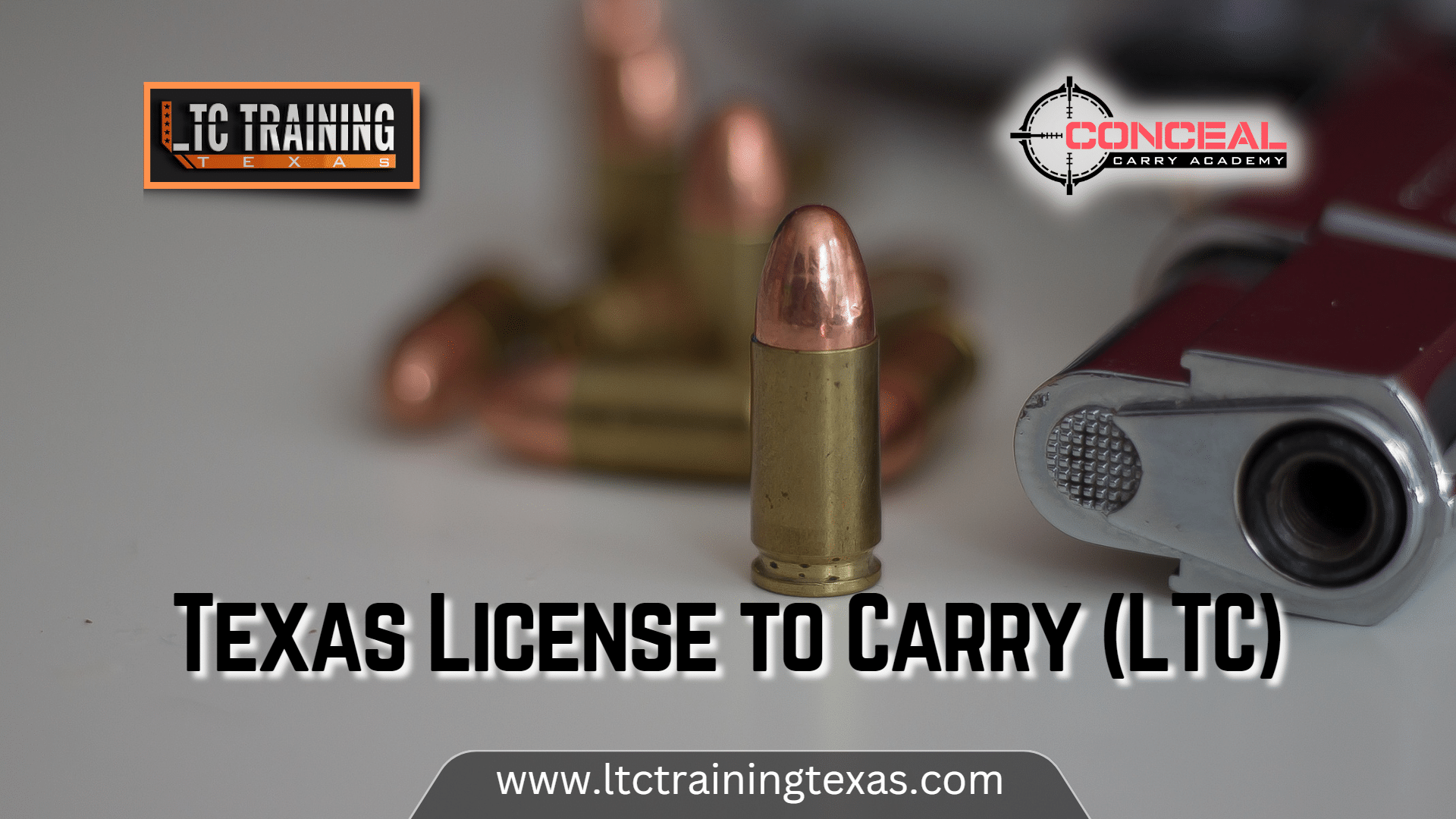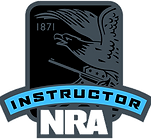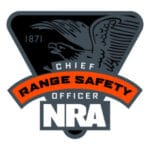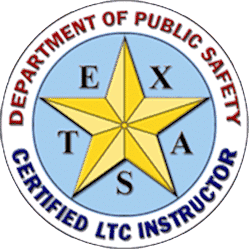Understanding the Texas License to Carry Process: Your Guide to Concealed Carry in the Lone Star State
Thinking about carrying a concealed handgun in Texas? The Lone Star State offers residents and qualifying individuals the opportunity to obtain a Texas License to Carry (LTC), also known as a License to Carry a Handgun (LTC). This license allows you to legally carry a concealed handgun on your person or in a purse or bag for self-defense purposes.
When you are ready you can start by taking our Texas License to Carry online class
But until then read on below with our guide
This comprehensive guide will walk you through everything you need to know about the Texas License to Carry process, from understanding the eligibility requirements to navigating the application process and beyond.
Let’s delve into the world of Texas concealed carry and ensure you have the knowledge to make informed decisions.
Benefits of Obtaining a Texas License to Carry (LTC)
There are several advantages to obtaining a Texas License to Carry (LTC). Here are some of the key benefits to consider:
- Legal Concealed Carry: The primary benefit of an LTC is the legal authorization to carry a concealed handgun on your person or in a purse or bag. This allows you to exercise your right to self-defense and potentially protect yourself and your loved ones in dangerous situations.
- Reciprocity with Other States: A Texas LTC is recognized by many other states throughout the country, granting you the legal right to carry a concealed handgun while traveling. This reciprocity can be incredibly convenient for those who frequently travel for business or pleasure. You can find the latest information on LTC reciprocity with other states here on our reciprocity page.
- Streamlined Firearm Purchases: An LTC can expedite the firearm purchase process in Texas. While background checks are still required by federal law, possessing a valid LTC eliminates the need for a separate background check at the point of sale from a licensed firearms dealer. This can significantly reduce the time it takes to complete a firearm purchase.
- Peace of Mind: Owning a firearm for self-defense is a personal decision. For many people, obtaining an LTC and understanding the legalities of concealed carry can provide a sense of security and peace of mind, knowing they have the means to defend themselves if necessary.
It’s important to remember that an LTC comes with significant responsibilities. As a licensed carrier, you are expected to be knowledgeable about Texas gun laws, understand the principles of safe gun handling, and practice responsible carry habits.
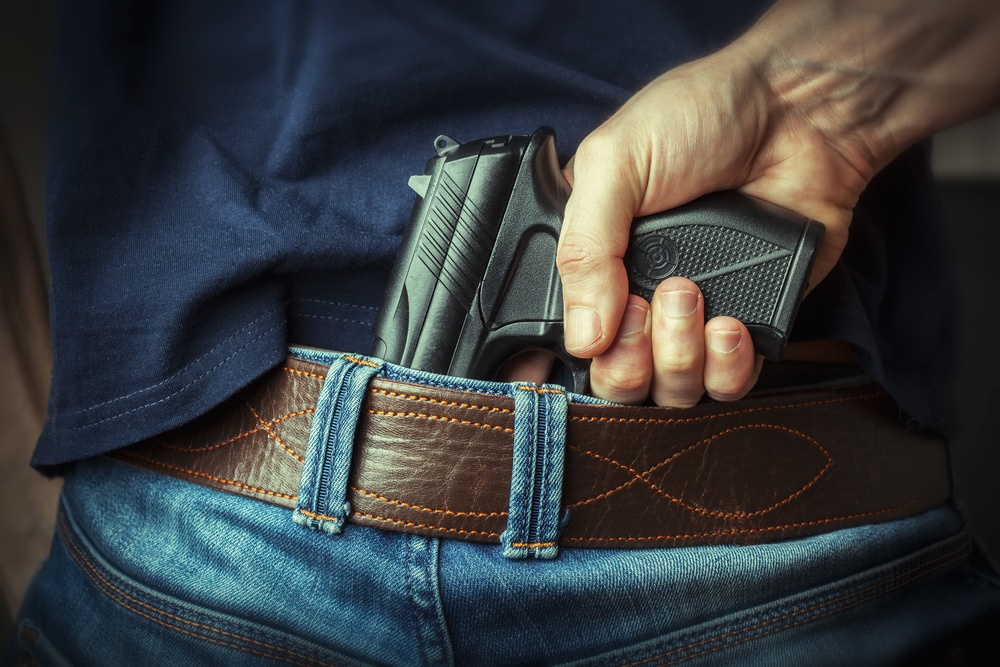
Texas Gun Laws: Understanding Open Carry vs. Concealed Carry
Texas is known for its relatively relaxed gun laws. However, there are distinct differences between open carry and concealed carry in the state, and understanding these distinctions is crucial for anyone considering an LTC.
Open Carry:
- In Texas, anyone 18 years or older who can legally own a firearm can openly carry a handgun in a holster on their hip or belt without a license.
- There are, however, specific location restrictions for open carry. Open carry is prohibited in certain areas, including government buildings, schools, hospitals, bars, and sporting events. It’s important to be familiar with these restrictions to avoid legal trouble.
Concealed Carry:
- A Texas License to Carry (LTC) is required to legally carry a concealed handgun on your person or in a purse or bag.
- An LTC allows for greater flexibility in carrying a concealed handgun compared to open carry. You can carry concealed in most places where firearms are not otherwise prohibited by law, including businesses that post signage prohibiting open carry.

Here’s a table summarizing the key differences between open carry and concealed carry in Texas:
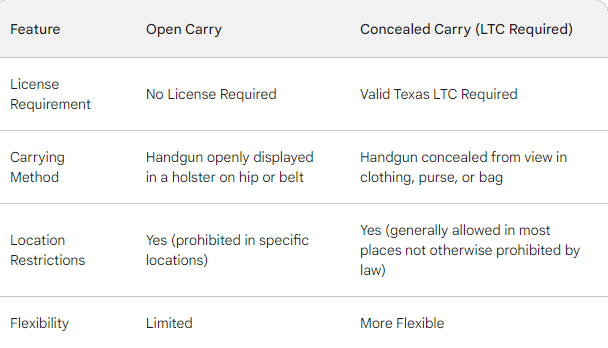
Important Note: As of January 2023, the minimum age requirement to apply for a Texas LTC has been lowered to 18 years old. However, federal law prohibits individuals under 21 from purchasing a handgun from a licensed firearms dealer ATF.
Eligibility Requirements for a Texas License to Carry (LTC)
Here’s a breakdown of the key eligibility criteria for a Texas LTC, as outlined by the Texas Department of Public Safety (DPS) on their website (https://www.dps.texas.gov/section/handgun-licensing):
- Age: As of January 2023, you must be at least 18 years old to apply for an LTC. However, federal law prohibits individuals under 21 from purchasing a handgun from a licensed firearms dealer ([#:~:text=ATF].) This means you may be eligible for an LTC at 18, but acquiring a handgun for concealed carry might require waiting until you turn 21.
- Residency: Texas residents, active military personnel stationed in Texas, and their spouses are eligible to apply for an LTC.
- Criminal History: You must not have been convicted of any felony offenses or certain Class A or Class B misdemeanors within the past five years. Disqualifying misdemeanors include domestic violence, assault, and offenses involving controlled substances. You can find a more detailed list of disqualifying offenses on the Texas DPS website.
- Mental Health: Individuals diagnosed with certain mental health conditions or subject to involuntary commitment orders may be ineligible for an LTC. The Texas DPS will review your mental health history during the application process.
- Citizenship or Legal Status: You must be a U.S. citizen or lawful permanent resident to obtain a Texas LTC.
Additional Considerations:
- Financial Responsibility: There is no requirement to demonstrate financial stability to obtain an LTC. However, you will need to pay the application fee, which varies depending on your military status.
- Character Requirements: There is no formal character test for an LTC. However, your overall criminal history and background will be evaluated by the DPS during processing.
Case Study: Understanding Disqualifying Offenses
Let’s consider a scenario to illustrate disqualifying offenses for an LTC. John, a Texas resident, was arrested for a Class A misdemeanor assault charge two years ago. The charge was eventually dismissed due to lack of evidence. While the dismissed charge itself wouldn’t automatically disqualify John from obtaining an LTC, the Texas DPS would likely scrutinize the details of the arrest during the application process. John would be wise to consult with an attorney specializing in gun law to understand how this incident might impact his eligibility.
It’s important to note that this is not an exhaustive list of eligibility requirements. The Texas Department of Public Safety provides the most up-to-date and comprehensive information on LTC eligibility. You can find their website by searching for “Texas DPS License to Carry” online.
Meeting the eligibility requirements is the first step towards obtaining your Texas LTC. In the next section, we’ll delve into the steps involved in the application process.
Steps to Obtaining a Texas License to Carry (LTC)
Obtaining a Texas License to Carry (LTC) involves a series of steps designed to ensure responsible gun ownership and adherence to safety regulations. Here’s a detailed breakdown of the process:
1. Take an Approved LTC Class:
- Completing a Texas-approved LTC course is mandatory for all LTC applicants. These courses typically last 4-6 hours and cover a range of essential topics, including:
- Handgun safety and safe handling procedures
- Texas gun laws and legal aspects of concealed carry
- Use of force principles and self-defense justification
- Handgun marksmanship and shooting fundamentals
- Our online Texas License to Carry Class is online. Complete as fast as you wish in the comfort of your own home.
2. Complete a Shooting Proficiency Demonstration:
- After completing your LTC class, you’ll need to pass a shooting proficiency demonstration. This qualification test typically involves shooting a specific number of rounds from a designated distance and achieving a minimum score to demonstrate safe and accurate handling of a handgun.
- Qualification Requirements: The exact requirements for the shooting proficiency test may vary depending on the instructor and range you use. However, they generally involve shooting at a standard target from a set distance, such as 7 yards or 15 yards, and hitting a certain number of targets within a specific time frame. Some instructors may offer practice sessions beforehand to help you prepare for the qualification test.
3. Apply to the Texas Department of Public Safety (DPS):
- Once you’ve completed your LTC class and shooting proficiency demonstration, you can submit your application online through the Texas DPS website. The online application process requires you to:
- Provide your personal information and contact details
- Answer background check questions
- Upload required documents, such as proof of residency (utility bill, bank statement), and completion certificate from your LTC class.
- Fingerprinting Requirements: As part of the application process, you will need to submit fingerprints electronically or visit a DPS location for fingerprinting services. The Texas DPS website provides a list of approved fingerprint providers in your area (https://www.dps.texas.gov/section/driver-license/online-services).
4. Pay the Application Fee:
- The application fee for a Texas LTC varies depending on your military status. The standard fee for civilians is currently $48, while active military personnel and honorably discharged veterans pay a reduced fee of $24. You can find the most up-to-date fee information on the Texas DPS website.
5. Wait for Processing and Approval:
- After submitting your application and fingerprints, the Texas DPS will conduct a thorough background check. Processing times can vary, but it typically takes 4-6 weeks to receive a decision on your LTC application. The Texas DPS will notify you by mail of the application status.
Here are some additional tips for a smooth application process:
- Gather all required documents beforehand to avoid delays. These documents may include driver’s license, proof of residency (utility bill, bank statement), and completion certificate from your LTC class.
- Double-check your application for any errors or omissions before submitting.
- Be patient during the processing period. The Texas DPS receives a high volume of LTC applications.
By following these steps and meeting the eligibility requirements, you’ll be well on your way to obtaining your Texas License to Carry. In the next section, we’ll explore some additional considerations and resources to help you navigate the LTC process effectively.
Additional Considerations and Resources for Texas LTC Applicants
Obtaining your Texas License to Carry (LTC) is an important step towards responsible concealed carry. This section will explore some additional factors to consider and resources to utilize throughout the process.
Renewal Process for Texas LTCs:
- Your Texas LTC is valid for four years. To maintain your license, you’ll need to renew it before the expiration date. The renewal process is generally simpler than the initial application and can often be completed online. The Texas DPS website provides detailed instructions and requirements for LTC renewal ([invalid URL removed]).
Carrying Restrictions with a Texas LTC:
- While an LTC grants you the legal right to carry concealed, there are still restrictions on where you can carry. Here are some general guidelines:
- You cannot carry concealed in places with specific signage prohibiting firearms (e.g., schools, government buildings, some businesses).
- You cannot carry concealed on certain federal properties, such as military bases or courthouses.
- Always be aware of specific restrictions that may apply at private businesses or events. Posting signage that prohibits open carry does not necessarily mean concealed carry is prohibited as well. It’s important to inquire with the business owner or management to clarify their policy on concealed carry.
Going Beyond the Minimum: Additional Training Resources
- The LTC course is a mandatory first step, but ongoing training is highly recommended for responsible gun ownership and concealed carry proficiency. Here are some resources for additional training:
- National Rifle Association (NRA) Courses: The NRA offers a variety of courses on handgun safety, marksmanship, and self-defense tactics specifically designed for concealed carry permit holders ([invalid URL removed]).
- Private Firearms Instructors: Many qualified firearms instructors offer personalized training tailored to your specific needs and skill level. You can find local instructors through online directories or by contacting your local gun range.
Legal Considerations and Resources for LTC Holders:
- Carrying a concealed handgun comes with legal responsibilities. Here are some resources to help you stay informed:
- Texas Lawshield: Texas Lawshield provides legal defense plans specifically designed for LTC holders, offering legal advice and representation in case of a self-defense incident ([invalid URL removed]).
- Texas Attorney General’s Office: The Texas Attorney General’s website offers resources on Texas gun laws, including information on self-defense laws and use of force principles.
Remember: Obtaining a Texas LTC is a significant responsibility. As a licensed carrier, you are expected to:
- Maintain a thorough understanding of Texas gun laws and carrying restrictions.
- Practice safe gun handling procedures at all times. This includes using proper holsters, keeping your firearm unloaded and secured when not in use, and following the four basic rules of gun safety.
- Carry your LTC and a valid form of identification whenever carrying concealed.
- Be prepared to answer questions from law enforcement officers lawfully and courteously.
By following these guidelines and taking advantage of the available resources, you can ensure a safe and responsible concealed carry experience with your Texas License to Carry.
Responsible Gun Ownership and Safe Carry Practices
Congratulations! You’ve now gained a comprehensive understanding of the Texas License to Carry (LTC) process. Obtaining your LTC empowers you to exercise your right to concealed carry for self-defense purposes. However, with this right comes a significant responsibility – the responsibility to be a safe and responsible gun owner.
Here are some key takeaways to remember:
- Knowledge is Power: Continually educate yourself on Texas gun laws and carrying restrictions. Stay updated on any changes or modifications that may occur. Resources like the Texas DPS website and the Texas Attorney General’s website can be invaluable sources of up-to-date information.
- Safety First: Always prioritize safe gun handling practices. Invest in high-quality holsters for safe and secure carry, and take advantage of opportunities for additional training beyond the LTC course requirements. Familiarize yourself with gun cleaning and maintenance procedures to ensure your firearm functions reliably.
- Be a Responsible Carrier: Concealed carry is a privilege, not a right. Carry your LTC and a valid form of identification at all times when concealed carrying. Be prepared to answer questions from law enforcement officers lawfully and courteously. Understand the legal implications of using a firearm in self-defense situations.
- Seek Additional Training: Consider ongoing training to hone your shooting skills and situational awareness. This can significantly enhance your ability to handle a self-defense situation effectively. Training courses can also help you develop a deeper understanding of defensive shooting tactics and the legal considerations involved in concealed carry.
- Develop a Mindset for Safety: Owning a firearm for self-defense is a serious responsibility. Cultivate a mindset of de-escalation and conflict avoidance whenever possible. Not all situations require the use of deadly force.
Remember, gun ownership is a serious matter. By prioritizing safety, knowledge, and responsible carry practices, you can ensure your LTC serves its intended purpose – empowering you to protect yourself and your loved ones while promoting a culture of safe gun ownership in Texas.
Final Note:
Gun laws and regulations can be complex and subject to change. The information provided in this blog post should not be considered legal advice. Always consult with a qualified attorney specializing in gun law for guidance on specific legal questions or concerns.
Here are some additional resources you may find helpful:
- Texas Department of Public Safety (DPS) LTC Information: (https://www.dps.texas.gov/section/handgun-licensing)
- National Rifle Association (NRA) – Institute for Legislative Action (ILA): (https://home.nra.org/) (https://www.nraila.org/)
- Texas Attorney General’s Office – Gun Laws: (https://guides.sll.texas.gov/gun-laws/carry-of-firearms)
By utilizing these resources and prioritizing responsible gun ownership, you can ensure a safe and legal experience with your Texas License to Carry.
Some quick Faqs to help you get strated:
How long does it take to get a carry permit in Texas?
The processing time for a Texas LTC application can vary depending on the workload of the DPS. Generally, it takes no more than 60 days from the date of application for the DPS to process your application and issue your license
That being said you need to make sure your application is complete and true.
So if you look at timing:
Our Online Class: 4-6 hours
Range Familiarization: 1-2 Hours depending on location
Fingerprints / Passport Photo: 1 Hour
And the drive time to do everything thing. That’s all it takes

